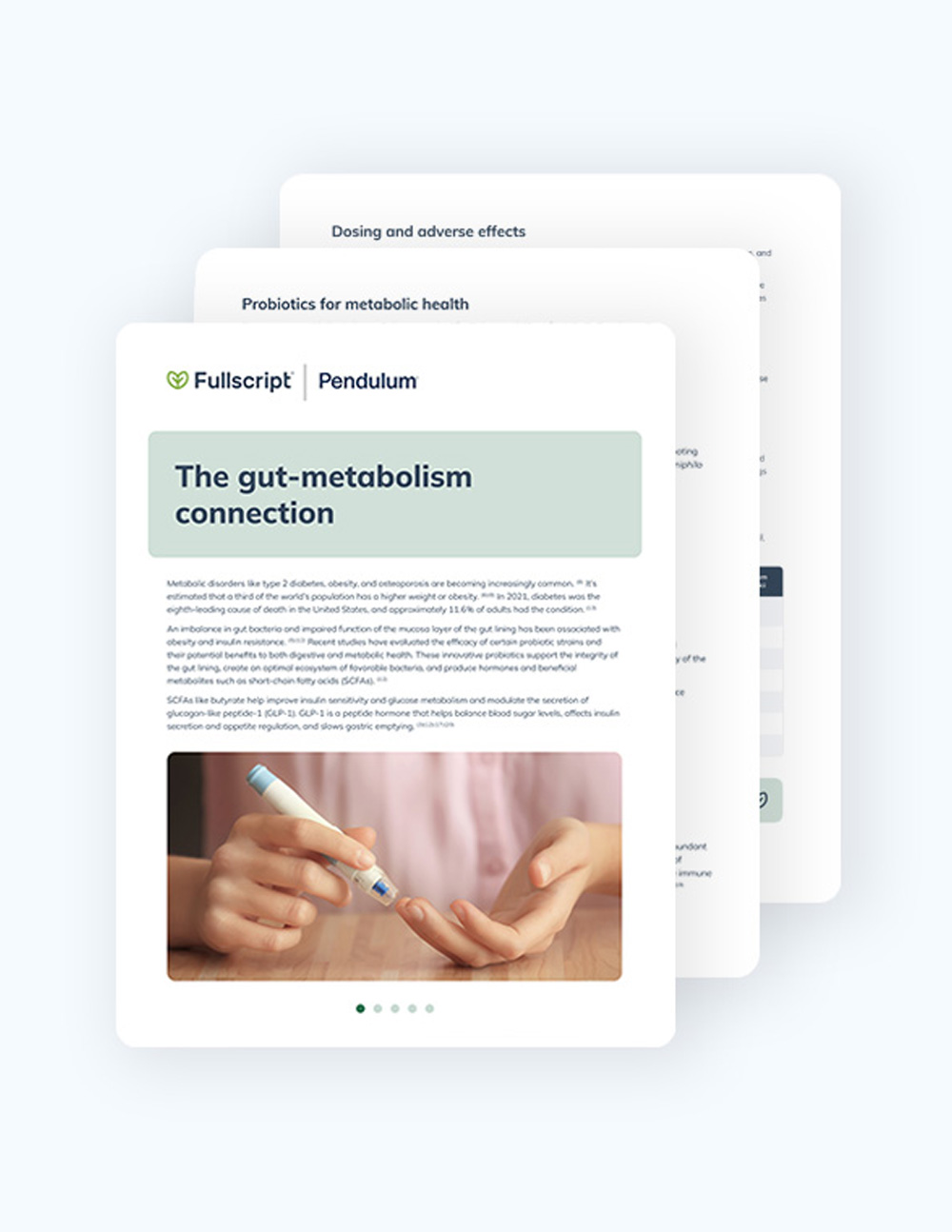Did you know? Diarrhea is defined as three or more watery or loose stools per day.
Causes of acute diarrhea
The most common cause of acute diarrhea is viral infection (e.g., norovirus, rotavirus, viral gastroenteritis). Acute diarrhea may also be a result of:- Bacterial infections, commonly responsible for Traveler’s diarrhea (e.g., E. coli, Campylobacter, Salmonella, Shigella)
- Certain medications (e.g., antibiotics, magnesium-containing antacids, certain cancer medications)
- Parasitic infections (e.g., Entamoeba histolytica, Cryptosporidium enteritis, Giardia lamblia) (1)(15)(16)(4)
Causes of chronic diarrhea
While certain infections, particularly those caused by parasites, may result in chronic diarrhea, the condition is caused primarily by non-infectious agents, including:- Abdominal surgery
- Colon cancer
- Diabetes mellitus
- Digestive tract dysfunction (e.g., Celiac disease, irritable bowel syndrome, small intestinal bacterial overgrowth, ulcerative colitis, Crohn’s disease)
- Food allergies and intolerances (e.g., dairy, eggs, soy, cereal grains, seafood, fructose)
- Ischemia of the gut
- Long-term use of certain medications (e.g., antibiotics leading to C. difficile infection, NSAIDs, antacids, antihypertensives, antiarrhythmics)
- Polyps
- Radiation therapy (1)(15)(16)

Signs, symptoms, and complications
In addition to passing three or more watery or loose stools per day, individuals with diarrhea may experience:- Abdominal pain, cramps
- Bloody stools
- Fatigue
- Fever and chills
- Urgency to use the bathroom
- Light-headedness, dizziness
- Loss of control of bowel movements
- Nausea
- Vomiting (1)(15)
- Decreased skin turgor (when skin is pinched and released, it does not return to normal immediately)
- Fainting, lightheadedness
- Fatigue
- Sunken eyes or cheeks
- Thirst, dry mouth
- Urinating less and dark-colored urine (15)
- Bloating, gas
- Changes in appetite
- Loose, greasy, foul-smelling bowel movements
- Weight loss (15)
Ingredients for soft stools
While acute diarrhea typically resolves within a few days, anti-diarrheal medications, such as loperamide and bismuth subsalicylate, are commonly used to address severe diarrhea symptoms. (1)(15) Chronic diarrhea treatment typically depends on the underlying cause. For example, antibiotics are often used to treat bacterial or parasitic infections, while specific medications may be used in cases of Crohn’s disease, irritable bowel syndrome, or ulcerative colitis. (15) In cases of both acute and chronic diarrhea, replenishing fluid and electrolytes is essential for preventing dehydration and its symptoms. (1)(16) The dietary supplements outlined below have also demonstrated effectiveness in supporting the treatment of diarrhea.
Probiotics
Probiotics are defined as “live microorganisms which, when administered in adequate amounts, confer a health benefit to the host”. (13)(14) Probiotics are typically recommended to help support immune function and/or to address a number of health conditions (14), such as hypercholesterolemia, immunoinflammatory disorders, nosocomial and respiratory tract infections, and diarrheal diseases. (13) While the exact mechanism of action of probiotics has not been confirmed, a number of possible mechanisms have been suggested, such as:- Alteration of microbiota composition
- Displacement and inhibition of pathogenic bacteria
- Enhancement of epithelial lining function
- Induction of intestinal epithelial cell µ-opioid and cannabinoid receptors
- Modulation of immune activity and inflammatory mechanisms
- Modulation of the stress response and reduction of visceral hypersensitivity and spinal afferent traffic (22)
Prebiotics
Prebiotics are defined as “a nondigestible compound that, through its metabolization by microorganisms in the gut, modulates composition and/or activity of the gut microbiota, thus conferring a beneficial physiologic effect on the host”. (3) Prebiotics are essentially carbohydrate compounds that meets the following unique criteria:- Fermentation by intestinal microbes
- Resistance to gastric acidity, enzyme hydrolysis, and absorption in the gastrointestinal tract
- Selective stimulation of growth and/or activity of intestinal microbes conferring health benefits to the host (19)(20)

Pectin
Pectin, a soluble dietary fiber with prebiotic properties, is a mixture of polysaccharides that constitutes approximately 35% of fruit cell walls. (7) Pectin is found naturally in certain foods, including fruits, vegetables, legumes, potatoes, and sugar beets. (5) Commercially, pectin, derived primarily from citrus peel and apple pomace, is commonly used as a gelling-agent in jams and jellies and as a stabilizer in milk beverages and fruit juices. (21) Pectin has been shown to promote a favorable anti-inflammatory microbiota profile (7) and delay gastric emptying. (23) Pectin balances the microflora and decreases systemic inflammation, which may improve diarrhea-associated irritable bowel syndrome (IBS-D). (24) Research has also shown that pectin can reduce the frequency of vomiting, stool frequency, and diarrheal duration in children. (18) Furthermore, fibers and prebiotics may help reduce diarrhea in patients receiving enteral nutrition. (10)The bottom line
Supplementation with probiotics, prebiotics, and pectin has been shown to be effective in preventing and addressing symptoms of diarrhea. A protocol using natural supplements can be used therapeutically on its own or as an adjunct to existing treatment. When recommending nutrients or botanicals as an adjunct to treatment, be sure to check for possible interactions with pharmaceutical medications to prevent possible negative health outcomes in patients. If you’re a patient, we recommend speaking with your healthcare provider to find out whether these supplements are right for your wellness plan.- American College of Gastroenterology. (2012). Diarrheal diseases: Acute and chronic. Retrieved from https://gi.org/topics/diarrhea-acute-and-chronic/
- Bae J. M. (2018). Prophylactic efficacy of probiotics on travelers’ diarrhea: An adaptive meta-analysis of randomized controlled trials. Epidemiology and Health, 40, e2018043.
- Carlson, J. L., Erickson, J. M., Lloyd, B. B., & Slavin, J. L. (2018). Health effects and sources of prebiotic dietary fiber. Current Developments in Nutrition, 2(3), nzy005.
- de la Cabada Bauche, J., & Dupont, H. L. (2011). New developments in traveler’s diarrhea. Gastroenterology & Hepatology, 7(2), 88–95.
- Dhingra, D., Michael, M., Rajput, H., & Patil, R. T. (2012). Dietary fibre in foods: A review. Journal of Food Science and Technology, 49(3), 255–266.
- Drakoularakou, A., Tzortzis, G., Rastall, R.A., & Gibson, G.R. (2010). A double-blind, placebo-controlled, randomized human study assessing the capacity of a novel galacto-oligosaccharide mixture in reducing travellers’ diarrhoea. European Journal of Clinical Nutrition, 64(2), 146-52.
- Dreher M. L. (2018). Whole fruits and fruit fiber emerging health effects. Nutrients, 10(12), 1833.
- Hempel, S., Newberry, S.J., Maher, A.R., Wang, Z., Miles, J.N., Shanman, R., … Shekelle, P.G. (2012). Probiotics for the prevention and treatment of antibiotic-associated diarrhea: A systematic review and meta-analysis. JAMA, 307(18), 1959-69.
- Ishaque, S. M., Khosruzzaman, S. M., Ahmed, D. S., & Sah, M. P. (2018). A randomized placebo-controlled clinical trial of a multi-strain probiotic formulation (Bio-Kult®) in the management of diarrhea-predominant irritable bowel syndrome. BMC Gastroenterology, 18(1), 71.
- Kamarul Zaman, M., Chin, K. F., Rai, V., & Majid, H. A. (2015). Fiber and prebiotic supplementation in enteral nutrition: A systematic review and meta-analysis. World Journal of Gastroenterology, 21(17), 5372–5381.
- Lewis, S., Burmeister, S., & Brazier, J. (2005). Effect of the prebiotic oligofructose on relapse of Clostridium difficile-associated diarrhea: a randomized, controlled study. Clinical Gastroenterology and Hepatology, 3(5), 442-8.
- Macfarlane, S., Macfarlane, G.T., & Cummings, J.H. (2006). Review article: Prebiotics in the gastrointestinal tract. Alimentary Pharmacology and Therapeutics, 24(5), 701-714.
- Majeed, M., Nagabhushanam, K., Natarajan, S., Sivakumar, A., Ali, F., Pande, A., … Karri, S. K. (2016). Bacillus coagulans MTCC 5856 supplementation in the management of diarrhea predominant irritable bowel syndrome: A double blind randomized placebo controlled pilot clinical study. Nutrition Journal, 15, 21.
- McFarland L. V. (2010). Systematic review and meta-analysis of Saccharomyces boulardii in adult patients. World Journal of Gastroenterology, 16(18), 2202–2222.
- National Institute of Diabetes and Digestive and Kidney Diseases. (2016). Definition & facts for diarrhea. Retrieved from https://www.niddk.nih.gov/health-information/digestive-diseases/diarrhea/definition-facts
- Nemeth, V., Zulfiqar, H., & Pfleghaar, N. (2019). Diarrhea. StatPearls. Treasure Island (FL): StatPearls Publishing.
- Preston, K., Krumian, R., Hattner, J., de Montigny, D., Stewart, M., & Gaddam, S. (2018). Lactobacillus acidophilus CL1285, Lactobacillus casei LBC80R and Lactobacillus rhamnosus CLR2 improve quality-of-life and IBS symptoms: A double-blind, randomised, placebo-controlled study. Beneficial Microbes, 9(5), 697-706.
- Rabbani, G.H., Teka, T., Zaman, B., Majid, N., Khatun, M., & Fuchs, G.J. (2001). Clinical studies in persistent diarrhea: Dietary management with green banana or pectin in Bangladeshi children. Gastroenterology, 121, 554-560.
- Roberfroid, M. (2007). Prebiotics: The concept revisited. The Journal of Nutrition, 137(3), 830S–837S.
- Slavin, J. (2013). Fiber and prebiotics: Mechanisms and health benefits. Nutrients, 5(4), 1417-1435.
- Srivastava, P., & Malviya, R. (2011). Sources of pectin, extraction and its application in pharmaceutical industry: An overview. Indian Journal of Natural Products and Resources, 2(1), 10-18.
- Verna, E. C., & Lucak, S. (2010). Use of probiotics in gastrointestinal disorders: What to recommend?. Therapeutic Advances in Gastroenterology, 3(5), 307–319.
- Wikiera, A., Irla, M., & Mika, M. (2014). Health-promoting properties of pectin. Postepy Higieny I Medycyny Doswiadczalnej, 68, 590-6.
- Xu, L., Yu, W., Jiang, J., Feng, X., & Li, N. (2015). Efficacy of pectin in the treatment of diarrhea predominant irritable bowel syndrome. Zhonghua Wei Chang Wai Ke Za Zhi, 18(3), 267-71.






